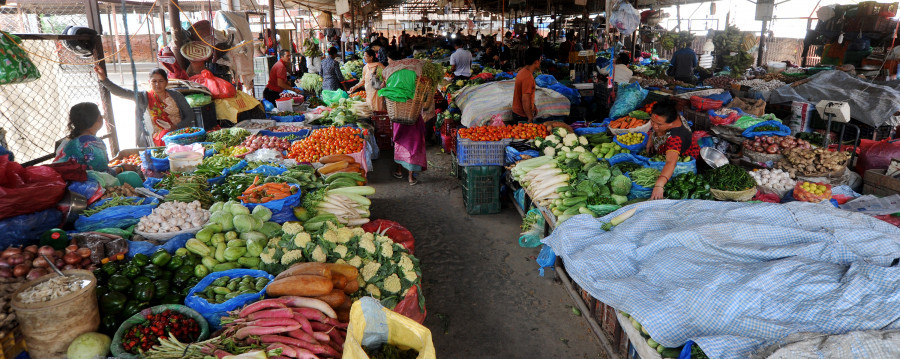Money
Kalimati fruits and vegetables market stops retail sales
Consumer rights activists said that without a proper distribution system in place, this could lead to price hikes.
Krishana Prasain
Retails sales of fruits and vegetables have been banned from Thursday at the Kalimati produce bazaar in a bid to comply with social distancing rules. The crowds were getting too big during the morning shopping window, raising fears of infections spreading with all the jostling, officials said.
The agriculture market has been closed as of Tuesday. Wholesalers will remain open from 1 to 9 am, but they are allowed to sell pre-packaged produce only.
Consumer rights activists said that without a proper distribution system in place, shutting down the market could lead to artificial price hikes.
The Kalimati market is the country’s largest vegetable and fruit bazaar which keeps Kathmandu's homes supplied with fresh produce.
The Kalimati Fruits and Vegetables Market Development Board said it decided to pull down the shutters after the District Administration Office expressed concern over the large number of shoppers gathering at close quarters during an inspection visit.
On Tuesday, the District Administration Office announced that the lockdown in the Kathmandu Valley was being extended by 15 days. It said the time provided to Kathmandu residents to buy daily consumable goods was being lengthened by one hour till 10 am.
Binaya Shrestha, deputy director of the Kalimati Fruits and Vegetables Market Development Board, said the retail and agriculture market would remain closed for the duration of the lockdown as ordered by the District Administration Office.
“We expect that this step will help to minimise crowds and make wholesale trade safe amid the ongoing pandemic,” he said.
Observing the throngs of shoppers in the market, the board published a notice on Tuesday saying that the retail and agriculture market would be closed, and that the wholesale market should be operated by closely following social distancing and health and safety protocols.
“Crowds have increased at the retail market so the board decided to close it,” he added.
The Kalimati market has also banned the entry of motorbikes, bicycles and pushcarts onto the premises. Shrestha said vehicles bringing vegetables would be allowed to enter the market all day.
Consumer rights activists said closing down the market without proper management of distribution could lead to artificial price hikes in fruits and vegetables.
Madhav Timilsina, president of the Consumer Rights Investigation Forum, said that if only wholesale trade is allowed in the big vegetables and fruits market, it will create artificial price hikes.
“Only a few traders and people have access to the wholesale market as many consumers rely on the retail market,” he said.
"Rather than making distribution systems easy and reliable, the government, without proper planning, comes with such decisions which ultimately hit the consumer," Timilsina said. "This will not only impact consumers, but there are chances that farmers’ products will also rot in the fields like last year."
Despite the fall in prices in recent days with the arrival of seasonal vegetables, valley residents are hardly able to get most vegetables and fruits for less than Rs100 per kg.
Timilsina said that with sufficient rains recently, the production of green vegetables is good currently, but retail prices are going up every day.
According to Shrestha, the market is receiving 400-500 tonnes of vegetables daily in recent days as it is difficult for truckers to deliver vegetables due to the restriction order. “Supply has declined as consumption has also weakened,” he said.
Rajita Dhital, a resident of Kuleshwor, said that she had to pay Rs170 for a dozen bananas while the wholesale price was Rs100 at the Kalimati market on Tuesday.
Shutting down the Kalimati market during the lockdown last year to control the spread of the coronavirus, the board in coordination with Kathmandu Metropolitan City had planned to open outlets to sell vegetables and fruits at 11 places around the city. “But it did not become successful,” Shrestha said.
Timilsina said that the government could have supplied vegetables from vans or huge army trucks in different areas in the valley.




 14.24°C Kathmandu
14.24°C Kathmandu















